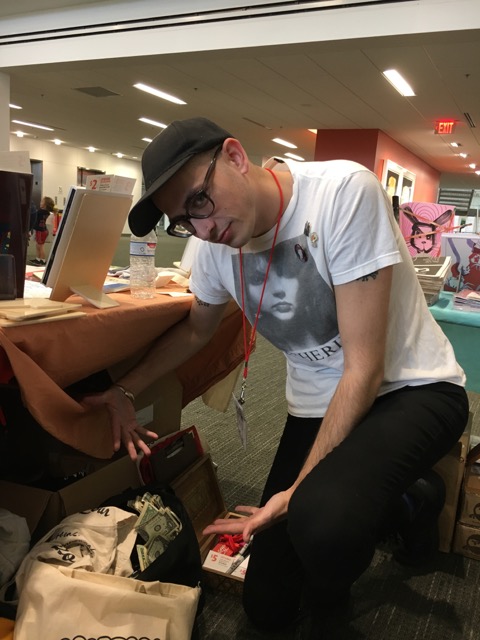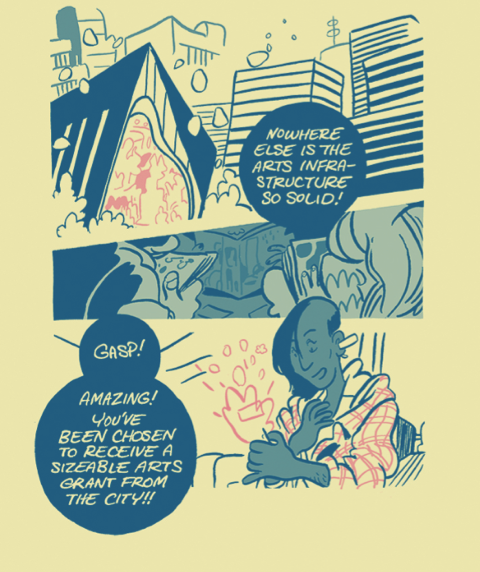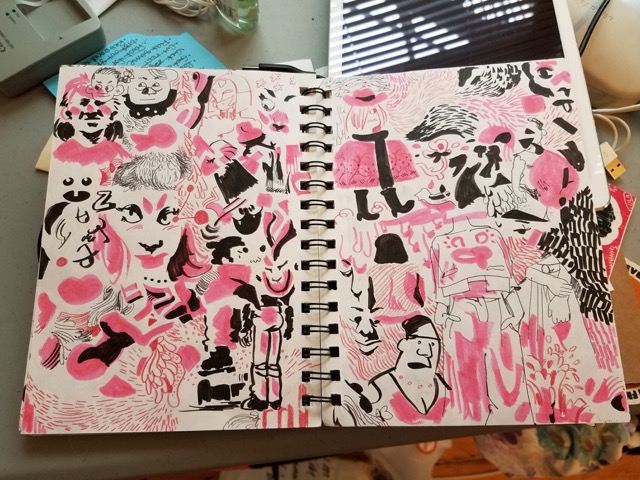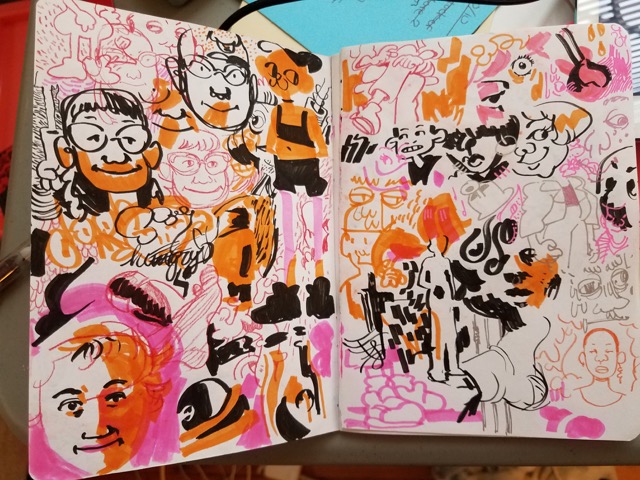“The Emerging Talent Award – this goes to a cartoonist whom we feel has plenty of promise as a cartoonist and has shown themselves to be a solid and giving community member as well… We love everything we’ve ever learned about you, in terms of your comics community heart.”
—Tom Spurgeon, during the presentation of Jeff Smith and Vijaya Iyer’s Emerging Talent Award to Kevin Czap at CXC, 2016.

By a combination of good luck and being an early bird at a pick-your-own-table convention, I ended up tabling close to Kevin Czap of Czap Books during the recent Cartoon Crossroads Columbus expo. This proximity allowed for neighborly chats and also afforded me a front-row spot when they were awarded the CXC 2016 Emerging Talent Award. Jeff Smith and Vijaya Iyer presented Kevin with a $7,500, no-strings-attached award in the form of a novelty check. It was a special moment to witness at CXC – a generous display of support for a deserving artist.
A week later, I met up with Kevin in Providence, Rhode Island, to continue the conversation about CXC, comics and community.
Alyssa: Tell me a little bit about winning the Emerging Talent Award at CXC. What was that like for you?
Kevin Czap: I’ve been going to shows in Columbus with that crowd for a long time. I do a lot of shows – this year I’m going to be doing a total of 14 or 15, more than I usually do. So I know a lot of people, but there are a number of people I don’t necessarily think they know who I am, or I’m not necessarily on their radar… I’m just going about my thing. I didn’t expect it at all. It felt nice in that regard – plugging away at this thing and trying to be a part of the larger conversation of comics that I feel a part of is being represented at CXC. So the award felt like acknowledgement, that you are being noticed and heard, which feels nice. I’m doing all of this stuff without expectation of reward, it’s just what I what I want to do, but it’s definitely nice to see some traction.
A: You recently did a Kickstarter for the 2017 collection from Czap Books that more than doubled the amount of money you asked for, and you won this Emerging Talent Award, both within a short span of time. It’s pretty wild, right?
KC: I was thinking about that on the drive home [from CXC] and I was crying a lot. Not only that, last year Annie Koyama approached L. Nichols and I about funding Ley Lines, and she gave us a big check for printing the whole line for a year (as well as to pay the artists). And she just did that again for next year. I’ve collected close to what my salary was at my old full-time job to put into making comics, just out of people’s kindness and support of me. It’s too much (laughs).
A: It’s the perfect amount! What was your old full-time job?
KC: I was a web and graphic designer for a marketing firm in Northeast Ohio. It took good care of me but as I was becoming more ambitious with comics-things that had various facets of identity, the time got to be too much. I was spending the whole day thinking about the comics work that I was not getting done.
A: It’s a leap of faith, as an artist, to leave a full-time job.
KC: This award validates that decision even more. And also with the Kickstarter, I’ve been able to see the gains that I’ve made since leaving that job, and all of the time I’ve been able to put to good use.
A: You have a lot of projects going at once: your own comics, publishing other people’s work, Ley Lines… In addition to those projects you are going to 15 festivals this year. It’s a pretty basic question but how do you manage your time?
KC: In the beginning of the year, I figured out a really nice system of dividing up the days into specific blocks so everything is being worked on continually. But then after the first couple of big shows I fell off that a little bit. Now I’m trying to catch back up and get in to it again. Generally I just have a million to-do lists. I realized there are things I really don’t want to do, like call somebody on the phone or ask a stranger a question where the ‘no’ could be a scary thing. But if I put it on the to-do list, I have to cross it off.
A: Do you love crossing things off?
KC: It’s the greatest thing in the world.
A: I was just reading Fütchi Perf and I’m wondering about the process that goes into your comics.
KC: I’ve been trying to speed it up a little bit. Generally I’ll have ideas and over a couple months, they’ll formulate. Different bits and pieces of an idea will grow and crystallize and an image will pop out of that. I feel like I work better in smaller chunks. Fütchi Perf was made in discreet units over time. The first couple stories were for specific publications or tasks. I was living in Cleveland and the local alt-weekly had a comics issue: ‘do Cleveland of the future.‘ I did a single page that I later adapted to the first story in Fütchi Perf.
A lot of them are based off of experiences I’ve had. I try to shove across any plotting ideas I have. ‘Alright that doesn’t matter, what is the feeling, what do I keep obsessing over?’ The story I was just talking about, I was trying to capture the feeling of going to my first house show – going down this hill and there is this weird house and it’s going to change your life but you don’t know it yet.
From there I’ll have the images and then I try to run through the actions in my head. I’ll write out the lyrics or phrasing of the song. I’ve always been obsessed with this idea of somehow translating the feeling or structure of a song to a comic. Some of the more recent work I’ve done I’ll literally try and dissect the structure of song lyrics and try and transcribe that to panels.
But for Ley Lines, it was different. I wrote all of the words first. I had some images like I usually do but it was writing out the actual lines, then rewriting and editing before drawing.
A: Your Ley Lines book, The Letting Go, was inspired by a conceptual artist (Bas Jan Ader)?
KC: Yeah, it’s an artist I learned about in college who I’m still interested in. I was reading a lot of writing about his work and my friend gave me a copy of a documentary about his life and work. I was thinking about these things in general and trying to shove that into a more personal, auto-biographical thing.
A: I work with auto-bio in my own work but I try to pull away from the specific and make it more of a relatable feeling. With the auto-bio stuff, is that really close to you?
KC: I feel like it’s really personal but it’s heavily coded. There’s a very thick screen. Some of the lines or words are directly things I’ve thought about my own situation but taken out of context to be more relatable and capture a feeling. Everything I do is really earnest, but there is a layer of self-consciousness about that because you have a sense that people don’t take earnestness seriously or it’s an easy route to being bad. There’s always an awareness of that. I don’t want it to be naive, but I do think that earnestness and honesty are important.
A: When I made Alpenglow for the Comics Workbook competition, I made a conscious decision to re-imagine that story through kinder eyes. I have the tendency to go toward a heavy-hearted place but I wanted to be more positive, for myself and the people who would read it. When you’re making your work are you conscious of what’s being put out into the ether…of wanting to put positive vibrations into the universe (I’m sorry, I’m a half-hippie!)?
KC: No, totally. That’s a lot of where Fütchi Perf started coming from. That idea of how can I turn this into positive energy that I can put into the world? It’s partly what I’m putting out into the world but it’s also what I’m putting into myself, too. I realized at some point it’s very easy to grow negativity in your own mind and I could see where that path leads. How can you correct that behavior, or view it another way? It is a lot of explicitly taking something and flipping it to see, what’s another outcome of this, what do you actually want to happen?
A: That’s interesting that you say ‘what do you actually want to happen’ because as I was reading Fütchi Perf, in the first story, a character is “chosen to receive a sizable arts grant.”
KC: Oh, ha, I forgot about that. That’s so funny because that specifically came out of not getting a grant and I thought, wouldn’t it be great if I had?

A: Tell me about the comics community and how you might add to it.
KC: As far as the community goes, my role – if I can do anything, I want to be able to bridge some gaps and constantly be true to my idea of comics being a very diverse and interesting medium full of possibility and not about any one particular way a comic looks or is made.
A lot of it involves me constantly questioning and revisiting my own assumptions and tastes. I think it’s valuable to revisit those assumptions. Part of why it seemed important to me to go into publishing, besides liking it – promoting other people’s work and putting books together which is fun – is being very aware that the culture and history of comics is editable. It’s created by active involvement.
——————————————————————————————

One of my favorite things to see is a work in progress or sketchbook from an artist I admire. I asked Kevin if they would bring something in progress along to our meeting.
KC: Right now I’m working on some things, but it’s all writing at this point. This is a recent sketchbook. It started as all ballpoint pen, and more recently I brought in the highlighter. With the line drawings, it’s like a wall I can’t get past. I want to do more blocky color.
——————————————————————————————
Kevin Czap – a.k.a. “Comics Mom” – has been making comics since they were a child in Northern Virginia. They live in Providence, RI, where they run the publisher and distro Czap Books. Their most recent work is The Letting Go (Ley Lines #8 – August 2016). Catch up with Kevin at Comic Arts Brooklyn this weekend (Nov. 5th 2016)!
Alyssa Berg makes comics in Brooklyn, NY. You can find her work HERE.
